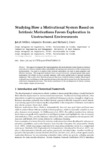Studying How a Motivational System Based on Intrinsic Motivations Favors Exploration in Unstructured Environments

Use este enlace para citar
http://hdl.handle.net/2183/41057Metadatos
Mostrar el registro completo del ítemTítulo
Studying How a Motivational System Based on Intrinsic Motivations Favors Exploration in Unstructured EnvironmentsFecha
2024Resumen
This paper investigates the implementation of a motivational system based on intrinsic motivation in robots to enhance their adaptability in learning new processes within unstructured environments. Our goal is to explore how intrinsic motivation can lead to more adaptive and effective learning. The proposed methods focus on goal discovery and perceptual state space exploration, for which we use a novelty measure with some added noise to prevent learning stagnation. The results show that the proposed discovery methods achieve similar effectiveness in identifying novel features in the perceptual state as the algorithms tested from the literature but with lower computational times. This study contributes to the development of robotic systems with a higher degree of autonomy.
Palabras clave
System Random Network Distillation (RND)
Dynamic Auto-Encoder (Dynamic-AE)
Episodic Curiosity Module (ECO)
EX2 (Exploration by Extrapolation)
Robot
Dynamic Auto-Encoder (Dynamic-AE)
Episodic Curiosity Module (ECO)
EX2 (Exploration by Extrapolation)
Robot
Versión del editor
Derechos
Atribución 4.0






